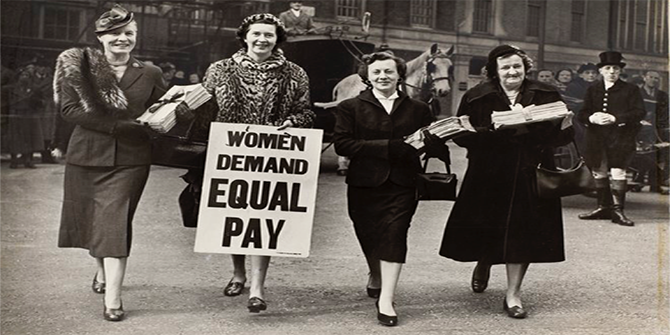 While extreme low pay has been reduced very substantially since the introduction of the National Minimum Wage, low pay itself still remains a serious problem. Alan Manning looks at the success of the policy, once politically contentious, and explores ways in which it can be updated to address remaining issues with low pay.
While extreme low pay has been reduced very substantially since the introduction of the National Minimum Wage, low pay itself still remains a serious problem. Alan Manning looks at the success of the policy, once politically contentious, and explores ways in which it can be updated to address remaining issues with low pay.
The UK’s National Minimum Wage (NMW) is now 14 years old. But, rather than being a troublesome teenager it seems to have settled down into a premature staid middle age. Although political parties might quibble about the details of how much the NMW should be increased each year, its continued existence is supported by all. It is easy to forget that when it was first introduced in 1999, the National Minimum Wage was controversial. Its introduction had been a major policy proposal of the new Blair government but had been strongly opposed by the outgoing Conservative government which provided dire warnings of massive job losses. The Conservative Party remained committed to its abolition for some years. Today this has changed – by 2005 David Cameron, then the new leader of the Conservatives said: “I think the minimum wage has been a success”. The current Chancellor, George Osborne said in 2008 that “modern Conservatives acknowledge the fairness of a minimum wage”.
This broad acceptance partly reflects the fact that the minimum wage is very popular among the public. But it also reflects the excellent job done by the Low Pay Commission (LPC) whose evidence-based approach has limited the scope for political posturing in discussions about the appropriate level and form of the minimum wage. In a poll of political experts by the Institute of Government, the minimum wage was voted the most successful UK government policy of the past 30 years ahead of the Northern Ireland peace process. A fair amount of credit for that must go to the first chair of the Low Pay Commission, George Bain who managed to achieve a remarkable amount of consensus on the merits of the NMW, namely that its economic impact has been positive –the NMW has raised incomes for the lowest-paid, increased incentives to work and reduced pressure on tax credits to prevent in-work poverty, all without jeopardizing employment prospects.
So it is striking that George Bain has agreed to chair a new project on ‘The Future of the National Minimum Wage and the Low Pay Commission’ launched by the Resolution Foundation on Thursday. The main reason why the Low Pay Commission and the NMW deserve a new look is that while extreme low pay has been reduced very substantially since the introduction of the NMW, low pay itself still remains a serious problem – the fraction of the population earning less than half the median hourly earnings has fallen sharply but the fraction earning less than two-thirds is very stable. Because the NMW has had a much lower ripple effect up the pay distribution than was initially anticipated (and feared because of its possible implications for inflation) it has only affected those with very low levels of pay, and has not reached those who earn slightly more. And the current squeeze in living standards documented by the IFS recently has not just affected the lowest-paid but is harder for them to bear because they have so much less room to tighten their belts.
Without pre-judging the outcome of the project there are a number of issues that are likely to be on the agenda.
First, the remit of the LPC. This tends to focus on short-term objectives (what should the NMW be next year?) and narrow, though often important, questions of detail (for example, in 2013 it was asked to “review the accommodation offset”). What the LPC does not have is a remit to map out a long-term strategy to address the continuing problem of low pay in the UK. In many ways it is a Minimum Wage Commission and not a Low Pay Commission as it is not invited to consider a range of approaches to dealing with low pay.
Within its traditional confines one might consider, for example, whether the minimum wage should be higher in London (where the cost of living is much higher than in the rest of the UK) or in some industries which can afford to pay higher wages. And also whether the current system of varying the minimum wage by age – I argued in a report for the Resolution Foundation last year that one should perhaps consider a higher minimum wage for the over-30s because they are more likely to be in long-term low pay, to have dependents (and child poverty is a big problem in the UK) and the labour market could probably support it as it does pay 30 year-olds much more than 20-year olds. But others have argued that we should eliminate all variation in the minimum by age.
But there are less traditional approaches that should also be considered. In recent years the most exciting idea in tackling low pay are the Living Wage Campaigns which seek to encourage employers to voluntarily commit to paying the living wage which is higher than the NMW. In fact, in many areas of economic and social policy we are struggling with the idea that simply allowing individuals to follow the letter and not the spirit of the law puts too much weight on the law itself in sustaining desirable outcomes. Think of David Cameron arguing against legal though ‘aggressive’ tax avoidance, and the Banking Commission arguing that financiers have failed to take responsibility for reckless though legal behaviour. In the case of the minimum wage the spirit of the law is that one should not pay wages that are exploitative and what is exploitative depends on what you can afford to pay. So, perhaps some aspect of voluntarism could be adopted to help the parts of low pay the minimum wage does not seem able to reach.
And another idea is to try to work with specific sectors. Over half of all low-paid workers are in hospitality, retail and cleaning, all non-traded sectors. The old Wages Councils (abolished in 1993) sought to deal with low pay issues in particular issues and while one would not probably want to resuscitate their rather convoluted approach to the problem, there is perhaps some scope for developing sector-specific strategies for dealing with low pay.
The NMW has been a fabulously successful policy and as George Bain pointed out it is a remarkable achievement to have developed consensus on what was once a very contentious policy. But this does not mean we have solved the problem of low pay – perhaps it is time to consider some different approaches.
Yet today this success has led not to a widespread enthusiasm for its future potential—once the economy picks up—but instead to widespread caution. Enthusiastic supporters of the minimum wage are understandably anxious about jeopardising what has been achieved while those who remain more sceptical know that their best hope is that the minimum wage either fades in value over time or, at the very least, fades from public debate as a potentially radical tool of public policy.
Note: This article gives the views of the author, and not the position of the British Politics and Policy blog, nor of the London School of Economics. Please read our comments policy before posting.
Alan Manning is Professor in the Department of Economics at the London School of Economics and director of the Labour Markets Programme at LSE’s Centre for Economic Performance.







